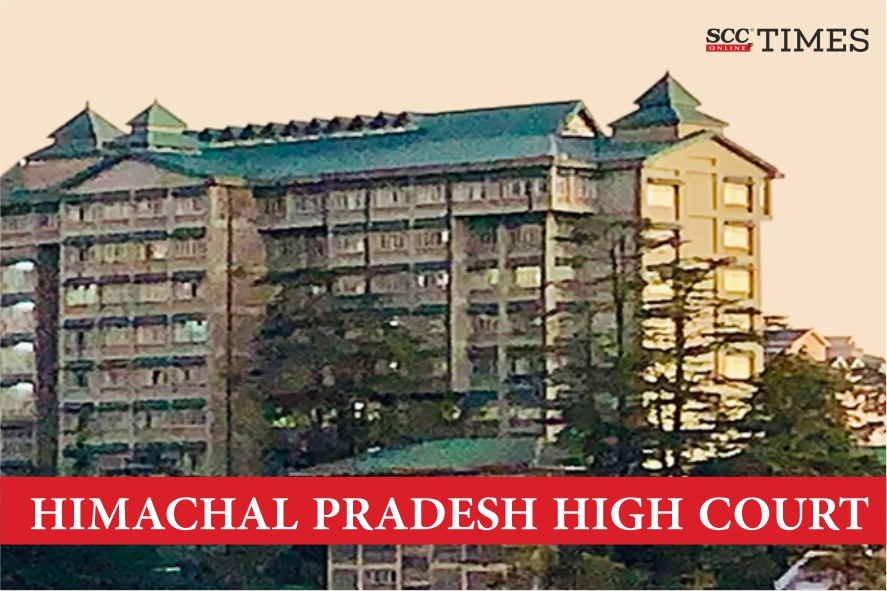Himachal Pradesh High Court: In a civil writ petition filed seeking the transfer of registration of certain vehicles bought by the petitioner in an auction due to the pendency of taxes, a Single Judge Bench of Tarlok Singh Chauhan* and Sushil Kukreja, JJ., rejected the petition holding that the petitioner was not entitled to the benefit of tax exemption under Section 14(3) of the HP Motor Vehicles Taxation Act, 1972 (‘the Act’) as no previous intimation was given by previous owner/department having possession of the motor vehicles or the petitioner as per Section 14(2).
Background
The Department of Excise and Taxation (‘DET’) seized certain vehicles belonging to the Indian Techno Mac Company Ltd. (‘the Company’) during its search and seizure for tax invasion.
Pursuant to an order passed by the Court, an auction was conducted for the sale of certain assets belonging to the Company, which included certain vehicles. The petitioner participated in the auction and was declared a successful bidder for certain vehicles. Out of those purchased by him, 10 vehicles were found to be registered in the name of the State. The Court confirmed the sale in favour of the petitioner, and he was given possession of the vehicles pursuant to the possession certificate and sale certificate.
Thereafter, the petitioner applied for transfer of the registration in his name but was informed that the tax in respect of the vehicles purchased by him was pending for the period from 2015 to 2023, and unless the taxes were cleared by the petitioner, the registration certificates could not be transferred in the name of the petitioner. Hence, the instant petition.
Analysis
At the outset, the Court stated that it appeared that the petitioner misconstrued the provisions of the Act and could not declared entitled to exemption from payment of tax on motor vehicles purchased by him. This was evident upon perusal of Section 9 of the Act.
The Court stated that a case could be considered under Section 14 of the Act for exemption of the motor vehicle taxes and special road taxes only when a registered owner or the person having possession or control of the motor vehicle has given previous intimation in writing to the tax authority that the motor vehicle would not be used in any public place for a period as envisaged under Section 14(2) of the Act.
Adverting to the facts of the instant case, the Court noted that neither did the previous owner/department have possession of the motor vehicles nor did the petitioner submit any previous intimation before the competent authority seeking exemption, and thus, the petitioner was not entitled to the benefit of Section 14(3). Additionally, the Court noted that Condition 19 of the auction notice indicated that it was for the successful bidder/purchaser to pay GST, TDS, levies, duties, taxes, and cesses, including registration charges, stamp duty, etc., as were applicable, over and above the approved bid amount.
Rejecting the contention that the petitioner was being unreasonably burdened with the tax liability without any fault, the Court reiterated that there was no equity in taxation law, and further, equity would only come into play in case there is no law operating in the field. In the present case, there was already a law operating in the field, and therefore, equity had to yield before the law. For it is well settled that whenever a conflict is between the law and equity, law would prevail.
Accordingly, the Court rejected the petition, holding that it had no merit.
[Arif Khan v. State of H.P., 2025 SCC OnLine HP 1813, decided on 15-05-2025]
*Judgment authored by: Justice Tarlok Singh Chauhan
Advocates who appeared in this case:
For the petitioner: Rajiv Rai
For the respondent: Advocate General Anup Rattan, Sr. Addl. Advocate General I.N. Mehta, Addl. Advocate General Ramakant Sharma, Addl. Advocate General Navlesh Verma, Addl. Advocate General Sharmila Patial, Addl. Advocate General Sushant Kaprate, and Deputy Advocate General Raj Negi



